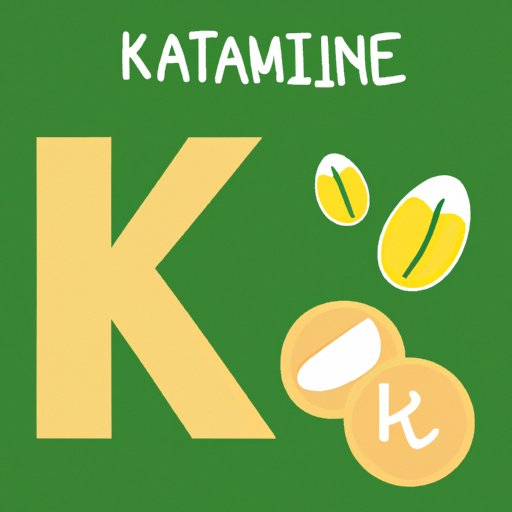
Introduction
Have you ever heard of vitamin K? This essential nutrient plays a crucial role in our health and wellness, from blood clotting to bone strength and even heart health. However, many people don’t know how to get enough vitamin K in their diets, especially if they have dietary restrictions or health conditions that affect nutrient absorption. In this article, we’ll explore the benefits of vitamin K, foods and supplements that are high in this nutrient, and tips for incorporating it into your lifestyle in a way that works for you.
Benefits of Vitamin K
Vitamin K is essential for many bodily functions, including blood clotting, strong bones, and heart health. Without enough vitamin K, we may be more prone to bleeding and bruising, and our bones may become weak and fragile, leading to conditions like osteoporosis. Additionally, vitamin K plays a role in cardiovascular health by preventing calcification of the arteries and reducing the risk of heart disease.
On the other hand, vitamin K deficiency can lead to serious health problems, such as excessive bleeding and hemorrhage. Furthermore, a long-term deficiency of vitamin K may raise the risk of osteoporosis and bone fractures.
Foods High in Vitamin K
If you’re looking to incorporate more vitamin K into your diet, there are many foods that are naturally rich in this nutrient. Leafy green vegetables like kale, spinach, collard greens, broccoli, brussels sprouts, and Swiss chard are all excellent sources of vitamin K. Not only are they packed with other essential nutrients, such as fiber and antioxidants, but they’re also versatile and can be incorporated into many dishes.
In addition, some animal products like liver, dairy, and eggs also contain vitamin K. Eating a well-rounded diet that includes a variety of vitamin K-rich foods can help ensure that you’re getting enough of this essential nutrient.
Supplements and Fortified Foods
In some cases, it may be difficult to get enough vitamin K from food alone, especially for people with dietary restrictions or health conditions that affect nutrient absorption. In these cases, taking vitamin K supplements or consuming fortified foods like cereals, milk, and pasta can be helpful.
However, it’s important to be cautious when it comes to supplements and fortified foods. High doses of vitamin K supplements can actually interfere with blood thinning medication, so it’s crucial to talk to your doctor before starting any new supplements. Moreover, some fortified foods may contain added sugar or sodium, which can have negative effects on overall health. Choose supplements and fortified foods wisely and always make sure to check the labels to ensure you’re getting a healthy product.
Recipes and Meal Plans
If you’re looking for ways to incorporate more vitamin K into your meals, there are plenty of delicious recipes and meal plans that can help you boost your intake. From hearty salads to savory soups, there are endless possibilities for cooking with leafy green vegetables and other vitamin K-rich ingredients.
Consider experimenting with adding kale and spinach to your morning smoothie or making a nutrient-packed veggie stir-fry for dinner. Simple changes to your diet can go a long way in providing the essential nutrition your body needs to thrive.
Health Conditions and Vitamin K
For people with certain health conditions, such as osteoporosis, liver disease, or bleeding disorders, getting enough vitamin K can be especially important. However, these individuals may have difficulty getting enough vitamin K through diet alone, which can be dangerous in some cases.
If you have one of these conditions, it’s important to talk to your doctor about how to obtain enough vitamin K to support your health. In some cases, vitamin K supplements may be necessary, but dosage and scheduling will depend on your specific condition and medical history.
Lifestyle Factors and Vitamin K
Certain lifestyle factors, such as age, eating habits, and medication use, can also affect our body’s ability to absorb and use vitamin K. For example, long-term use of antibiotics can disrupt the balance of gut bacteria, which can interfere with vitamin K synthesis. Age can also play a role in vitamin K absorption, as elderly individuals may have reduced levels of stomach acid, which can impair nutrient digestion and absorption.
To ensure adequate vitamin K intake, it’s important to pay attention to these factors and tailor your diet and supplement use accordingly. If you’re taking medications that affect blood clotting, such as warfarin, it’s especially important to work with your doctor to monitor your vitamin K intake and ensure that you’re not consuming too much or too little of this nutrient.
Conclusion
Vitamin K is an incredibly important nutrient that plays a role in many bodily functions. Whether you’re looking to boost your bone health, support your heart, or simply ensure that you’re getting all of the essential nutrients your body needs, incorporating vitamin K-rich foods and supplements into your lifestyle can be a great way to do so.
By focusing on whole, nutrient-dense foods like leafy greens and animal products, choosing supplements and fortified foods wisely, and paying attention to individual health and lifestyle factors, you can help support your health and wellness by ensuring adequate vitamin K intake.





